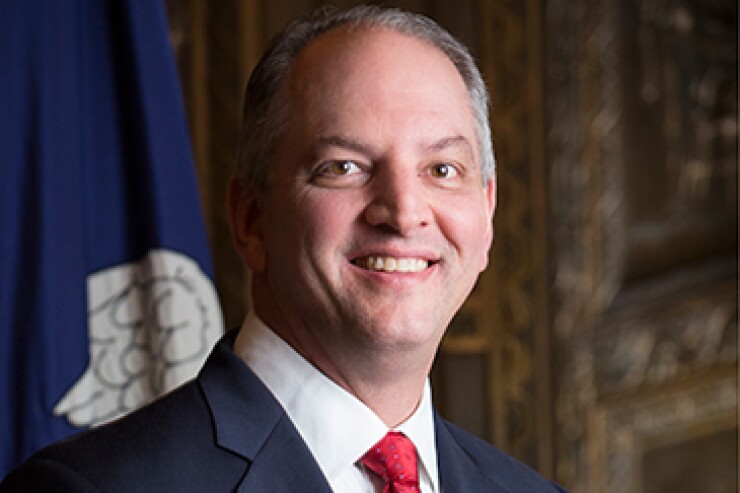
BRADENTON, Fla. - Louisiana Gov. John Bel Edwards' sweeping tax reform plan to stabilize the state budget met with immediate resistance from businesses that would be impacted by the biggest changes.
Edwards proposed a series of tax code rewrites on Wednesday that he said will overcome the loss of $1.3 million in temporary revenues that roll off the books July 1, 2018, and provide the state with about $400 million in new funding for critical programs that have been cut in recent years.
"The current tax and budgeting practices simply aren't working for Louisiana and don't provide a level playing field for both individuals and businesses," he said.
Basing many of his proposals on those made by a task force, Edwards said that a 1% state sales tax enacted on a temporary basis a year ago to supplant other declining revenues should be allowed to expire next year as planned.
Under his proposal, personal and corporate income tax rates would decrease, the deduction of federal income taxes in state filings would end, some tax credits would be repealed, and the state sales tax would apply to more goods and services through the elimination of exemptions.
The corporate franchise tax would be phased out over 10 years.
A cornerstone of the governor's plan is a "Commercial Activity Tax" that he said is designed to "create a fair tax system to ensure that we all pay our fair share."
Under the CAT plan, a flat tax between $250 and $750 would be charged to businesses with annual sales of $1.5 million or less.
Companies earning more than $1.5 million annually would be charged a 0.35% gross receipts tax.
The gross receipts tax is not a measure recommended by the tax reform task force.
According to a statement from Edwards' office, the Commercial Activity Tax was developed to create an alternative minimum tax for the state.
"Our corporate income tax would not go away and we are expanding our business tax base to other flow through entities," the statement said. "The gross receipts tax has proven to be a stable revenue source for Ohio and Texas."
Edwards said during a press conference Wednesday that the commercial tax plan is being suggested because in 2015 the Department of Revenue found that of 149,287 corporate tax filers in Louisiana, more than 129,000 paid "absolutely nothing in state income taxes."
"This simply asks more businesses to do their part," he said.
The Louisiana Association of Business and Industry decried the gross receipts proposal saying that national experts generally consider it "bad tax policy" as it relates to transparency, fairness and competitiveness.
"The gross receipts tax leads to increased costs of production and an effective tax rate that is hidden from the consumer due to a 'pyramiding' effect," said LABI Tax Council Director Jim Patterson. "It taxes the first dollar of receipts or revenue without regard to profitability or ability to pay."
Patterson said businesses are paying more than their fair share of taxes today, and "to allege otherwise is absolutely false."
Edwards said he is open to compromise on tax reform. His plan will be considered by the Legislature during its annual session which starts April 10.
Louisiana has been plagued by declining revenues amid a state recession and growing unemployment pushed by low oil prices. Multi-year budget cuts, due to structural imbalance, led to three rating downgrades in the last year.
On March 15, S&P Global Ratings lowered the state's GO rating to AA-minus from AA.
Last year, Louisiana's GOs were downgraded to Aa3 from Aa2 by Moody's Investors Service, while Fitch Ratings downgraded the state to AA-minus from AA.





